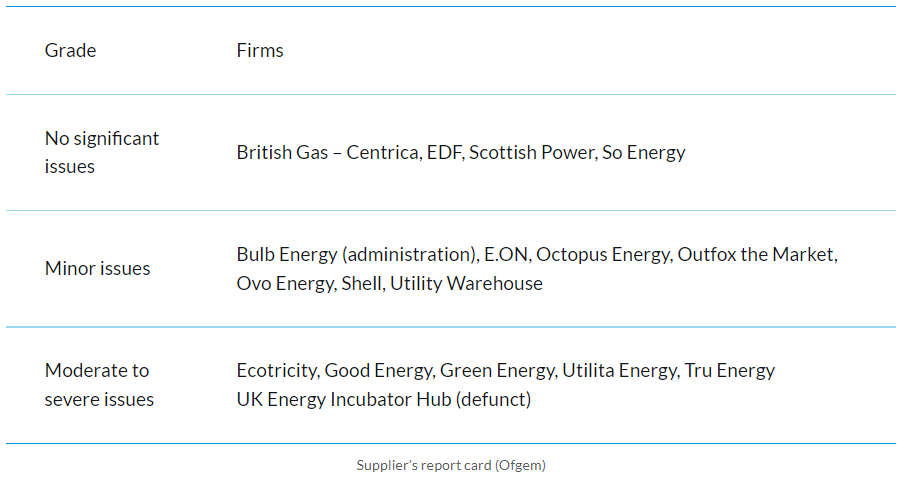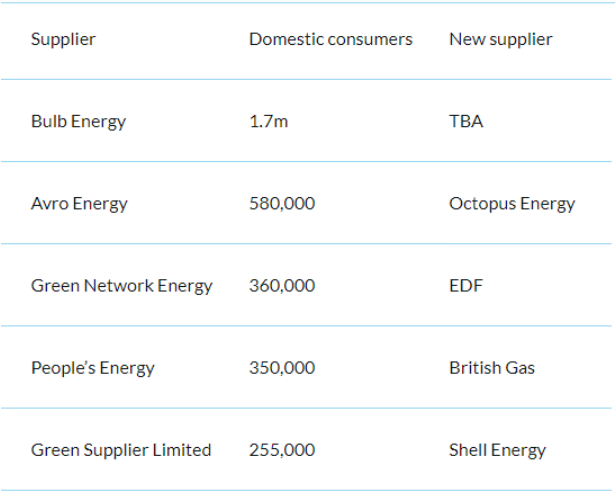Exclusive: Utilita Energy boss loses confidence in Ofgem after public warning

Utilita Energy (Utilita) boss Bill Bullen no longer has confidence in Ofgem, after the watchdog named and shamed the supplier over its handling of customers’ direct debit payments.
He told City A.M. he couldn’t trust them to navigate the industry through the ensuing crisis, describing Ofgem’s treatment of his firm as “outrageous.”
Bullen said: “I don’t have faith in Ofgem.”
In particular, the chief executive slammed Ofgem’s decision to label his energy firm as having issues with direct debits in a public press release.
He also raised issues over its handling of the price cap during the crisis, and the growing size of the regulator’s operations,
This follows Ofgem demanding a number of energy suppliers last week take immediate and urgent action after a review found a range of weaknesses in the way they charge customers direct debits.
Ofgem singled out six suppliers as having ‘moderate or severe’ issues with their direct debit processes.
This included Utilita, alongside Ecotricity, Good Energy, Green Energy UK, TruEnergy and the now defunct UK Energy Incubator Hub.
Bullen hammered the report as an “appallingly badly written press release” that encouraged people to “misinterpret it from the start” and demonise his firm.
“Ofgem seem to have taken a view of guilty until proven innocent,” he argued.
Issues over processing direct debit payments is particularly urgent, with energy specialist Cornwall Insight forecasting the consumer price cap could spike to £3,244 per year in October, and peak at £3,363 in January if it becomes t quarterly mechanism.
This would be when energy demand is at its highest during the coldest month of the year, putting more pressure on struggling households amid an escalating cost of living crisis.
Bullen hits back at Ofgem criticisms
Ofgem’s latest study showed that seven million customers on standard variable tariffs (SVT) saw an increase in their direct debit between February and April 2022 – reflecting soaring wholesale costs following Russia’s invasion of Ukraine.
On average, direct debit levels for customers on an SVT increased by 62 per cent in this period, while eight per cent of SVT customers seeing an increase (around 500,000 households) experienced an increase of more than 100 per cent.
This has concerned Ofgem, which has also seen evidence some suppliers’ processes are not as robust as they could be, and that this could lead to poor treatment for customers
The regulator has demanded a response from the six firms with ‘moderate to severe’ issues within the next two weeks.
Bullen has already written back to Ofgem’s boss Jonathan Brearley – and explained to City A.M. why he disputes the issues it has raised over how the firm processed payments.
The chief executive revealed Ofgem had highlighted three areas: documentation, communication and its low number of refunds.

He disputed Ofgem’s concerns with its documentation processes, and believed the watchdog exaggerated its importance.
Bullen said: “Anybody who knows about documentation and processes, knows documentation is never perfect. It can always be improved. Is that a major substantive issue for customers? Does it mean customers are overpaying their direct debit? No, it doesn’t.”
He also dismissed criticisms over communication issues – with the energy boss insisting the firm complies with requirements to communicate to customers when direct debit levels change and when it is taking debits from bank accounts.
“We fully comply with the direct debit guarantee. If that wasn’t the case, customers will be able to reclaim the direct debit and the bank would be screaming blue murder at us,” he said
Lastly, Bullen rubbished the claims the low number of refunds reflected poor customer service, instead suggesting it reflected consumer satisfaction with its business model.
He explained: “I would argue that if we’re not processing that many refunds our process is pretty good. We’re not generating the excess amounts of money, and are consequently not being asked to process refunds. Ofgem seem to think the fact we don’t process refunds is an indication of failure, which is completely bonkers.”
Utilita has also recently been in the crosshairs of consumer charity Citizens Advice, which placed the firm bottom of its list for customer service this year with a 1.6 out 5.0 rating.
Commenting on its low placing, Bullen explained: “So, we do have an above average level of customers contacting Citizens Advice. Citizens Advice think that’s our problem and classes ‘contacts’ made to them by our customers as ‘complaints’, regardless of whether we are at fault.”
He argued the star rating does not accurately reflect Utilita as a business, which has the highest number of prepay customers on smart meters of any supplier in the country, and that its net promoter scores and Trustpilot ratings were comparatively higher.
Ofgem expansion is a ‘horrible’ solution to market crisis
Bullen was disappointed that Utilita was being portrayed as “the villain of the piece” when only 27,000 of its 850,000 customers had direct debits.
The vast majority, over 90 per cent, were pre-payment customers – utilising pre-payment meters to meet their energy needs.
Bullen said: “We’re a tiny player. There are 20m customers out there with direct debits. We’ve only got 27,000 direct debit customers in total. Some of those did have direct debit increases of more than 100 per cent but it’s a tiny it’s a fraction of one per cent.”
“So, the vast majority – 99 plus per cent of those customers that went up by more than 100 per cent – I’m guessing they actually came from the companies Ofgem said were okay, because they’re the ones with the bulk of the direct debit customers.”
He also raised concerns over the continued use of the price cap, which has seen its lifespan extended for the coming years in the latest reforms from Ofgem to clean up the energy market after months of industry carnage which saw 30 suppliers collapse.

Bullen criticised the narrowing gap between the price cap for SVTs and pre-payment meters – which is currently around £40 – without compensation for firms reliant on pre-payment meters.
He said: “I think there’s a political incentive or desire to see prepaid prices equalised with direct debit prices, which is fine as long as you have a subsidy mechanism that helps make that work.”
Meanwhile, the energy chief noted that the latest Energy Bill was going to require a vast expansion of Ofgem’s workforce – which already has 1,700 people under employment, and more resources from the treasury.
He concluded: “It just feels to me as if that’s the answer – it’s a horrible question.”
When approached for comment, an Ofgem spokesperson said: “Ofgem works hard to make sure consumers are getting a fair deal, and as part of that we’ve been looking closely at direct debits. Our findings showed that whilst there is some excellent customer service out there, in certain areas of the market customers aren’t getting the service they need and deserve. We have made clear to some suppliers that urgent changes are now expected.”